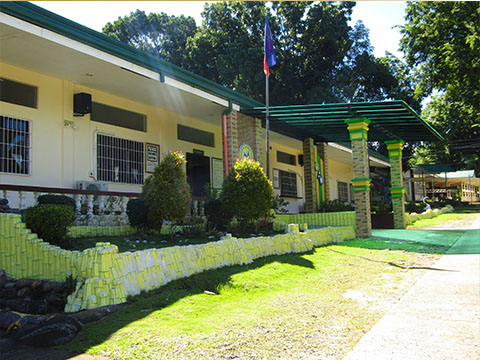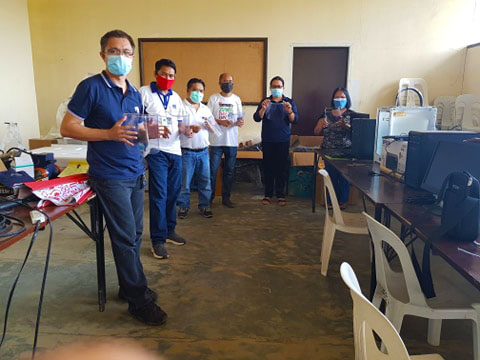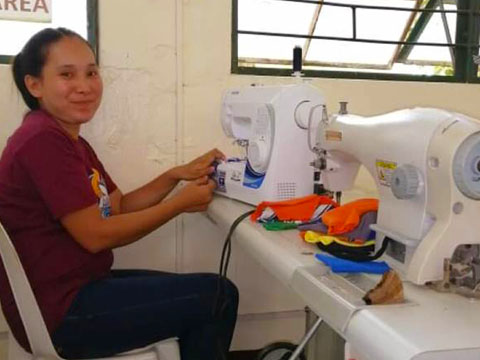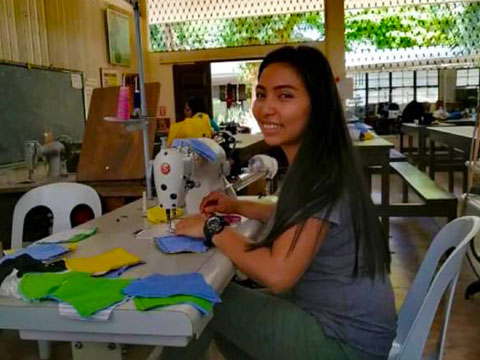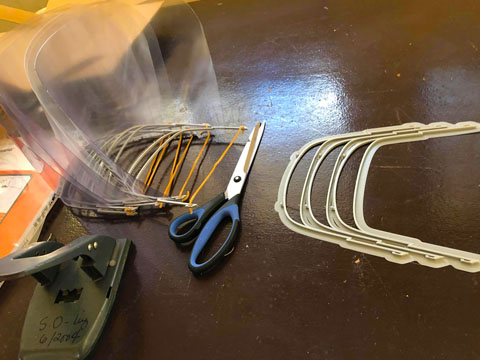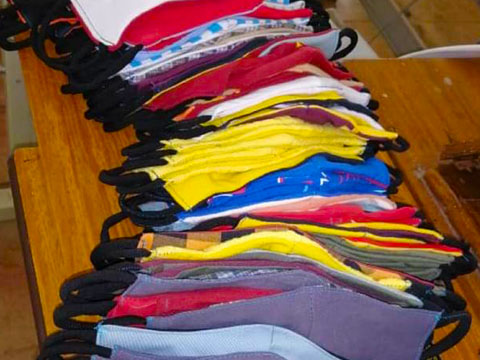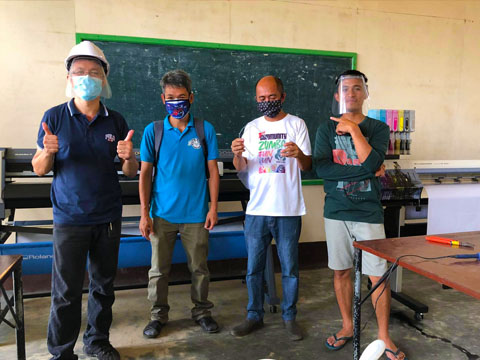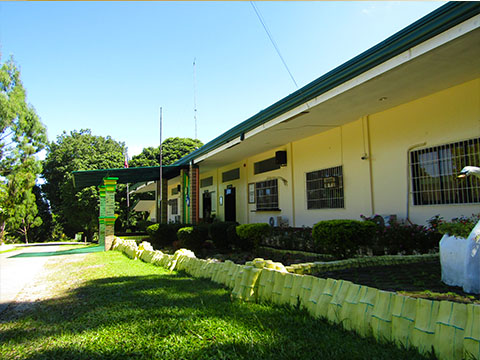
USM-KCC
The University of Southern Mindanao- Kidapawan City Campus (USM-KCC) is known to be the former North Cotabato College of Arts and Trades (NCCAT). Prior to NCCAT it was named Kidapawan Trade School (KTS) established in 1962 with the passage of Republict Act No. 3329, otherwise known as the “Higher Modernization Act of 1997” and pursuant to the Special Provision No. 2 of CHED FY 1999 Budget under the General Appropriation Act of 1999 or RA 8745 on the Integration of CHED-Supervised Instituitons (CSIs) to State Universities and Colleges (SUCs), the commission on Higher Education issues guidelines to effect integration of CSIs to the SUCs for immediate implementation. As per CHED Memorandum Order no. 18, series of 1999, North Cotabato College of Arts and Trades was integrate to the University of Southern Mindanao as the host SUC. On June 31, 2000 dated the formal turn-over of NCCAT to USM by CHEDRO XII Regional Director to the University President.
This external campus of USM is headed by the Campus Dean by virtue of BOR Resolution no. 30 s. 1999. The first USM-KCC Campus dean was Dr. Palasig U. Ampang, followed by Dr. Rogelio S. Tabora, Dr. Rufino S. Garzon, Dr. Rene U. Handoc, Dr. Herminigildo M. Gutierrez, Prof. Alfredo E. Naparan as OIC dean, Dr. Luz A. Taposok, then a short period for Prof.Alfredo E. Naparan as dean. At present, the campus has now the fiscal autonomy from University of Southern Mindanao, Kabacan, Cotabato and headed by Chancellor Dr. Ronielyn F Pinsoy.
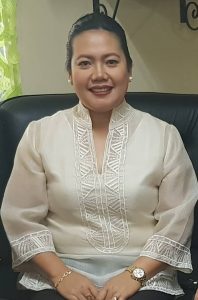
Goals
In general, the USM-KCC aims to provide quality comprehensive education while at the same time establish a vibrant, well-managed campus which fosters internal harmony and responsive to issues and concerns affecting its external environment. Specifically, USM-KCC aims to:
- Provide effective, efficient and transparent governance and management practices;
- Become a leader and model for teaching and learning in the fields of education, engineering, technology and other areas;
- Heighten the empowerment of communities particularly in alleviating poverty and sustainable management of resources through research, training and extension;
- Increase and manage enrolment, enhance and expand facilities, strengthen its financial position; and
- Make USM-KCC an excellent place to work and study.
Objectives
- To provide effective, efficient and transparent governance and management practices
- Implement fully the enhanced autonomy policy for USM-KCC
- Sustain efficient, transparent and effective management with consensus decisionmaking and guidance from the USM Main Campus; and
- Automate and make more convenient the financial and enrolment systems for USM-KCC constituents.
- Become a leader and model for teaching and learning in the field of education, engineering, technology and other areas;
- Continue and improve on its use of information and communications technology to facilitate teaching and learning both inside and outside the classroom;
- Provide adequate laboratory, classroom, library, health and other facilities;
- Offer additional programs which will contribute to the development of the campus’ area of responsibility;
- Continued program accreditation with appropriate bodies both international and local;
- Continue monitoring the performance of alumni in board exams and employment in both private and public sectors; and
- Hiring and retention of highly competent and qualified faculty and staff members (preferably those on CHED scholarships);
- Heighten the empowerment of communities particularly in alleviating poverty and sustainable management of resources through research, training, and extension
- Relevant and quality RET that responds to the needs of USM-KCC constituents;
- Enhance cultural heritage of indigenous peoples in the area of coverage;
- Provide adequate campus RET facilities that will encourage faculty, staff, and students to conduct RET activities
- Seek ways by which the intellectual output of USM-KCC personnel can be utilized and disseminated such as the establishment of a RET journal, participation in research and extension fora, or patenting/copyrighting intellectual properties;
- Increase and manage enrolment, enhance and expand facilities, and strengthen financial position
- Conduct consultations with constituents, especially as to courses that will be offered and/or revisions to existing ones which will redound towards better quality graduates and access to education especially among those coming from the underprivileged sectors of society;
- Enhance enrolment system that will allow enrolment from outside the campus;
- Improve farm production through adoption of modern practices and provision of adequate facilities;
- Improve income generation by providing improved facilities and new investments;
- Intensify efforts to seek fund sources and partnerships with outside sectors; and
- Improve funds utilization through judicious and timely expenditures made in accordance with government and USM rules and regulations.
- Make USM-KCC a convivial place to work and study
- Improve benefits of campus personnel within limits set by university policies and pertinent laws;
- Increase participation in campus extracurricular activities such as sports competitions, field trips, and others which promote harmony among personnel, students, alumni, parents/guardians of students, and surrounding communities;
- Increase participation in civic activities together with relevant local government units and agencies that will enhance the corporate responsiveness of the campus;
- Improve linkage with the private sector to implement projects designed to improve the welfare of campus constituents; and
- Explore more ways by which students and USM-KCC personnel can avail of scholarships and other forms of assistance for their education and professional development.
The Bachelor of Science in Industrial Engineering program is intended to prepare students for a professional Industrial Engineering career including a leading role in the design, improvement, and installation of integrated systems of people, materials, information, equipment, and energy. Graduates of the program must have specialized knowledge and skills in the mathematical, physical, and social sciences together with the principles and methods of engineering analysis and design to specify, predict, and evaluate the results to be obtained from such systems.
Program Objectives:
The program outcomes for BS in Industrial Engineering are given in the following minimum set. Graduates of the program must have:
- Ability to apply knowledge of mathematics and science to solve complex industrial engineering problems.
- Ability to design and conduct experiments, as well as to analyse and interpret data
- Ability to design a system, component, or process to meet desired needs with realistic constraints such as economic, environmental, social, political, ethical, health and safety, manufacturability, and sustainability, in accordance with standards
- Ability to function on multidisciplinary and multicultural teams
- Ability to identify, formulate, and solve complex industrial engineering problems
- Understanding of professional and ethical responsibility
- Ability to communicate effectively
Mechanical Engineering is a profession that concerns itself with mechanical design, energy conversion, fuel and combustion technologies, heat transfer, materials, noise control and acoustics, manufacturing processes, rail transportation, automatic control, product safety and reliability, solar energy, and technological impacts to the society. Mechanical engineers study the behaviour of materials when forces are applied to them, such as the motion of solids, liquids, gases, and heating and cooling of object and machines. Using these basic building blocks, mechanical engineers design space vehicles, computers, power plants, intelligent machines and robots, automobile, trains, airplanes, furnaces, and air-conditioners. Mechanical engineers work on jet engine design, submarines, hot air balloons, textile and new materials, medical and hospital equipment, and refrigerator and other home appliances. Anything that is mechanical or must interact with another machine or human being is within the broad scope of mechanical engineering.
Program Objectives:
By the time of graduation, the students of the program shall have the ability to:
- Apply knowledge of mathematics and science to solve complex mechanical engineering problems;
- Design and conduct experiments, as well as to analyse and interpret data;
- Design a system, component, or process to meet desired needs within realistic constraints, in accordance with standards;
- Function in multidisciplinary and multi-cultural teams;
- Identify, formulate, and solve complex mechanical engineering problems;
- Understand professional and ethical responsibility;
- Communicate effectively;
- Understand the impact of mechanical engineering solutions in a global, economic, environmental, and societal context;
- Recognize the need for, and engage in life-long learning
- Know contemporary issues;
- Use techniques, skills, and modern engineering tools necessary mechanical engineering practice;
- Know and understand engineering and management principles as a member and leader of a team, and to manage projects in a multidisciplinary environment.
The BSEd is an undergraduate teacher education program designed to equip learners with adequate and relevant competencies to teach in their chosen area of specialization/major in the secondary level.
Majors/Specialization
In USMKCC, the BSEd has the following Major:
- English
- Mathematics
- Social Studies
- Filipino
Program Objectives
The graduates have the ability to:
- Articulate and discuss the latest developments in the specific field of practice. (PQF level 6 descriptor)
- Effectively communicate in English and Filipino, both orally and in writing
- Work effectively and collaboratively with a substantial degree of independence in multi-disciplinary and multi-cultural teams. (PQF level 6 descriptor)
- Act in recognition of professional, social, and ethical responsibility
- Preserve and promote “Filipino historical and cultural heritage” (based on RA 7722)
The BTVTEd program is an undergraduate teacher education program that equips learners with adequate and relevant competencies in teaching specific area in Industrial Arts or Home Economics or ICT or Agri-Fishery – the four areas of technical and vocational track in the K to 12 Curriculum.
Majors/Specialization
In USMKCC, the BTVTEd has the following Major:
- Automotive Technology
- Electronics Technology
- Food and Service Management
- Garments, Fashion and Design
Program Objectives
The BTVTEd graduates have the ability to:
- Articulate and discuss the latest developments in the specific field of practice (PQF level 6 descriptor)
- Effectively communicate orally and in writing using both English and Filipino
- Work effectively and independently in multi-disciplinary and multi-cultural teams (PQF level 6 descriptor)
- Act in recognition of professional, social, and ethical responsibility
- Preserve and promote “Filipino historical and cultural heritage” (based on RA 7722).
Note: Bachelor of Technology, Bachelor of Industrial Technology, Diploma of Technology and Food Service and Preparation Technology anchored their curriculum at the BTVTEd.
Major in:
- Civil Technology
- Electrical technology
- Electronics Technology
- Mechanical Technology
- Heating, Ventilating & Air-conditioning Technology
- Welding & Fabrication Technology
- Food & Beverage Preparation and Service Management
Major in:
- Civil Technology
- Electrical technology
- Electronics Technology
- Mechanical Technology
- Heating, Ventilating & Air-conditioning Technology
- Welding & Fabrication Technology
- Food & Beverage Preparation and Service Management
| Name | Highest Educational Attainment | Specialization |
|---|---|---|
| ABARING, Zilpah D. | EdD(6 units) | English |
| AGUILAR, Justfer John D. | MA - Filipino | Filipino |
| ALCANTARA, Matt Edison G. | Ph.D. in Technology Mngt. (on-going) | Electronics |
| ALOJIPAN, Bonifacia A. | Ed.D | |
| ANTIQUISA, Jaime A. | MAT | Electrical |
| APOLINARIO, Marlyn D. | EdD. Educational Mngt. | English |
| AURE, Jeanne Y. | Ed.D. | Science |
| BALNEG, Carmee Lyn L. | Ph D. Mathematical Sciences (on-going) | Mathematics |
| BAUTISTA, Sheila R. | Ed D. Admin. Supervision | Civil Eng'g |
| BELTRAN, Darwin R. | MEP | Mechanical Eng'g |
| BINGIL, Analiza B. | Doctor of Eng'g -Energy (on-going) | Mechanical Eng'g |
| BOLASA, Erwin C. | ME Computer Eng'g. | Computer Eng'g |
| CABANTOG, Maria Hynee A. | MAED-Educ'l Admin. | English |
| CASIANO, Almira E. | MAED-Educational Mgt. | Science |
| CENTILLO, Mercedes T. | MAT-Science | Science |
| COLOMER, Ruby V. | MAED Guid. and Counseling | |
| CORNELIO, Marcial R. | MAED | Mechanical Tech. |
| DELA CRUZ, Cristina Q. | Ed. D.-Educational Mgt. | PE |
| ESTELLOSO, Emilie S. | Ph.D. in Education | Food Tech. |
| FLORES, April Rose B. | Ph.D. in Technology Mngt. (on-going) | Food Tech. |
| GAMOLO, George F. | Doctor of Technology (on-going) | Mechanical Eng'g |
| GASPAR, Evangeline S. | MAT-PE | PE |
| GONZAGA, Josephine A. | Ph.D. in Technology Mngt. (on-going) | Food Tech. |
| GRIJALDO, Vicky Q. | ME-ECE | Computer Eng'g |
| GUAY, Shellah A. | MBA | Industrial Eng'g |
| GUIAMAN, Baikongan B. | MBA | Accountancy |
| JUAREZ, Kathryn D. | Ph.D. in Technology Mngt. (on-going) | Food Tech. |
| LACBAYO, Phoebe Norvin B. | MAEd-ICT | ICT |
| LANOY, Fausto Jr. M. | MATIA | Drawing |
| LIM, Vanessa Jane C. | Ph.D. in Technology Mngt. (on-going) | Refrigeration and Air-Condition Technology |
| LLORITO, Marlowe E. | MATIA Master in Info. Mngt | ICT |
| LUMANG, Janet V. | MBA Master of Eng'g in Industrial Eng'g | Industrial Eng'g |
| MAGLINTE, Vhenus B. | Ph.D. in Applied Linguistic | English |
| MAIT, Nelben B. | MVE (30 units)/ MTE | Welding and Fabrication |
| MAMACUS, Jenny B. | MAED (30 units) Master of Tech (38 units) | |
| MANTAWIL, Liezel L. | MIT | Refrigeration and Air-Condition Technology |
| MELODIAS, Ben Hur Jr. G. | MAT (21u) MIT (36 u) | Automotive Technology |
| NAPARAN, Fredde Rick Jan G. | MTE (Acad. Reqt's.) | Automotive Technology |
| OQUENDO, Jojie Sonnette D. | MTE | Food Technology |
| ORTIGAS, Raphael P. | Master of Arts in Philosophy | |
| PARILLO, Girley M. | Ph D. Mathematical Sciences (on-going) | Mathematics |
| PAUNON, Danilo G. | MAT Mathematics | Mathematics |
| PECONADA, Joy D. | MEnglish in Applied Linguistics | English |
| PINEDA, Maria Elena P. | MBA | |
| PINSOY, Ronielyn F. | Ed D. | |
| PURUGGANAN, Ramil B. | Ph.D. in Educ'l. Leadership | |
| RAGONTON, Rebecca T. | MPAM units./ MAED equiv. /MTE | |
| RAMA, Jimmy D. | Ph.D in Math (on-going) | Mechanical Engineering |
| RAMOS, Sarah V. | MEnglish in Applied Linguistics | English |
| RENOBLAS, Jonathan D. | Ph.D. in Technology Mngt. (on-going) | Automotive Technology |
| REYNES, Janice E. | Ph.D in Applied Linguistics (on-going) | English |
| SABIT, Dhealyn Decee V. | Ph.D. in Education | Electronics |
| SABIT, Niño Chelvin E. | Doctor in Technology Educ. (acad. Req't) | Civil Technology |
| SANTOS, Jo-Ann D. | EdD in Filipino (on-going) | Filipino |
| SOSAS, Rowena V. | PhD in Applied Linguistic | English |
| SUASIN, Michelle P. | MS Computer Eng'g. | Computer Eng'g |
| TANGGAN, Jeconi Joice S. | MS Biology | Science |
| UGBANA, Dionesio S. | MATIA | Welding and Fabrication |

